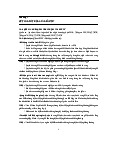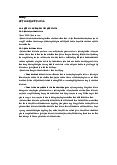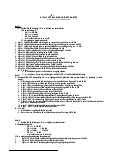









Preview text:
Chapter 4: Cultural awareness Start up
The development of communications technology, from the Internet to mobile phones, has
brought different parts of the world closer together. Communication is now instantaneous.
Decisions taken in one country can have an immediate impact in another. This increased
interconnectedness is reflected in the economic and cultural spheres.
Globalization is countries all over the world, which has been made easier by new technology and political
developments= (Oxford Business English Dictionary). It makes previously isolated cultures and
economics interdependent and interlinked.
In the economic sphere, the impact of globalization can be seen in the power and influence of
multinational corporations such as Shell, Microsoft, Nestle, and General Motors. There are over
60,000 multinational corporations throughout the world with more than half a million foreign
subsidiaries. It is estimated that these corporations account for 20% of world production and
70% of world trade. Opinion is divided on whether globalization is having a positive or negative
effect on local economies and cultures. However, there is no doubt that in the world of work,
there is more communication and interdependence between people of different cultures and languages than ever before.
This greater contact carries both benefits and potential problems. Cultural differences may be
seen in very obvious ways such as office hours, dress codes, and food. Attitudes towards
punctuality, for example, may vary from one country to another, and there may be different
attitudes to the use of titles in conversation and the exchange of business cards. Body language
and gestures are also a rich area for making cultural faux pas. It may be important in certain
cultures how you offer and accept a gift, or whether or not you can show the soles of your shoes.
There are also more subtle, and therefore potentially more affect work and relationships in the workplace. Employees in different countries may have quite
different attitudes towards the significance of planning, of how to manage meetings and
negotiations, and the importance of teamwork. 31
Misunderstandings may well be embarrassing, but they may also determine whether a meeting
or project is a success or a failure.
So it comes as no surprise that there are many books and courses available which aim to help
people work more effectively with colleagues and clients from other countries. Questions:
1. Which areas do visibly reflect the development of communications technology?
2. What does account for 70% of world trade?
3. Why can greater contact carry potential problems?
4. How can, in your opinions, people working in multinational corporations work
effectively with their colleagues and clients from other countries?
5. Find words or phrases in the text which mean:
- The state of starting doing business in countries all over the world.
- An action that causes embarrassment because it is not what people usually do.
- A motion used to express an idea or to emphasize an argument. - Working together in groups. Awareness
1. How cross-cultural are you?
Do you understand other cultures? Work in pairs. Complete each rule with must or mustn’t. 1. In Brazil, you
start a business discussion before your host. 2. In Germany, you use titles in business, you use first names. 3. You
hand over a gift using both hands in China. 4. You
immediately read a business card you are given in Japan. 5. In Australia, you
make and maintain eye contact. 6. You
smoke in the US unless you are sure it is permitted. 7. In Thailand, you show the soles of your feet. 8. You
use your right hand for eating in Islamic countries. 9. In Japan, you
open a gift in front of the giver. 10. You write notes in red in China.
2. Can you think of the stereotypes used about your culture? Use the words below to help. Reserved warm efficient Polite stylish open Eccentric punctual intellectual 32 Organized noisy lively Lazy undisciplined good sense of humor Imaginative passionate rigid Talkative romantic creative
3. Read the article and decide if the statements are true (T) or false (F).
1. You can stand close to an American when you speak to him or her.
2. It is normal to shake hands briefly when you meet for the first time.
3. Most Americans smile and look at each other when they greet.
4. It is offensive to wink in America.
5. It is not unusual for an American to ask a stranger about their job. America
Americans tend to need more personal space than other cultures. If you try to get too near an
American during a conversation, they will feel uncomfortable. If an American steps back, then
you are standing too close to them.
Men tend to avoid hugging and even women do not hug and kiss as much as many Europeans.
Formal greetings in America involve a quick film handshake and there isn9t much physical
contact. However, people smile at each other and make eye contact. Winking is relatively
common and means friendliness, or 8I9m kidding9.
When Americans meet for the first time they often ask 8What do you do?9 This is a normal
question and is not considered intrusive or personal. Workcheck
Complete this puzzle about travel and transportation and find the key word in 10 down. Across
1. What are Charles de Gaulle, J.F.K., and Changi? (8)
2. What can be excess, carry-on, or lost? (7)
3. What can be valid for ten years, out of date, or Canadian? (9)
4. Where can you be stopped, go through the green channel, or have something to declare? (7)
5. What can land, take off, or refuel? (6)
6. What can be express, local, or late? (6)
7. What can you miss, catch, or change? (7) 33
8. What can be one way, round trip, or APEX? (7)
9. What can be A.T.M., business, or credit? (5) Down
10. What can be first class, tired, or unaccompanied? 10 1 I 2 B 3 S P 4 U M 5 A 6 R 7 L T 8 K 9 C Reading
1. Work in groups and discuss the question to sell a product in your country?=
2. Read the article and answer the questions.
1. What did McDonald9s do in France to improve its image?
2. How do McDonald9s products in Hindu and Muslim countries differ from their global products?
3. What does Coca-Cola do to its product at a local level?
4. What does Yahoo do locally?
5. What positive results can come from glocalization?
3. Complete the paragraph with the following words. Communication improve create advantages Increase sensitive market The article speaks about some
1 of glocalization. It suggests various ways
in which international companies can
2 relations with their local markets. Firstly, they need to be
3 to local needs. Then they need to 4
products suited to local markets. Finally, they must 5 their products 34
appropriately. In these ways they can improve 6 with their market and 7 market share. Glocalization
Thinking globally, acting locally.
A. Glocalization (local + globalization) is a new word. It describes the strategy of being
global and being responsive to local conditions at the same time. It occurs, for example,
when global corporations customize their global products to suit the local culture. While
globalization has been criticized for causing problems, glocalization seeks to improve
relations between the big international companies and their local customers.
B. The American fast-food chain McDonald9s is often the target of the anti-globalization
movement. However, it is trying to be more sensitive to local needs. The French attacked
McDonald9s for its Americanization of French culture. So McDonald9s got rid of its
American mascot, Ronal McDonald, and adopted Asterix, a French cartoon hero, as its
local company mascot. It also serves French-style coffee in its restaurants. To avoid
offence in Hindu or Muslim countries, McDonald9s does not serve beef or pork – the Big
Mac has become the vegetarian Maharaja Mac.
C. Coca-Cola also creates products suited to local markets by producing local versions of
the drink. Even Yahoo, the Web portal, uses local teams of people to analyze the content
in each of its international sites.
D. If a company wishes to be internationally successful it has to market its products in
different ways for each country. Revlon, the cosmetics company, used Cindy Crawford
to advertise its products in Asia, while L9Oreal used a local Chinese star – Revlon lost
sales to its rival. The modern globalized world is often de-personalized, and a business
that can communicate better will increase its market share.
E. Large charities, such as Oxfam, also create local solutions for individual countries
instead of simply handing out money. So glocalization is not just about big business – it
is a concept that can help the fight against poverty and inequality around the world. 35 Getting it right
1. Know your customer
Companies have to understand the culture that surrounds their own established products.
Their customers expect certain levels of quality, taste, or image. Coca-Cola decided to
change the formula for its famous drink and created New Coke. Its market research
suggested that it was very popular. Unfortunately, when they launched it in 1985, they had a
disaster on their hands. The classic drink was an American icon. People didn9t want any
changes. So the sales of New Coke fell – and the company soon returned to its classic formula and classic taste.
• Why wasn9t New Coke successful?
• Think of other products that have changed. Were the changes always improvements?
• What problems could a company have when it promotes its products in foreign countries?
2. Check your language
Companies must also be aware of foreign cultures when they launch new products. They
have to understand local sensibilities and tastes – and the importance of language! The
Swedish company Electrolux launched its vacuum cleaners in the US with the slogan
8Nothing sucks like Electrolux9. Good suction is an excellent quality in a vacuum cleaner.
Unfortunately, in American slang, if something 8sucks9, then it is awful.
• What was the problem with the Electrolux slogan?
3. Work in groups. The following products had problems in their target markets. Discuss possible reasons.
• General Motors launched the Chevy Nova in South America.
• Schweppes started selling Tonic Water in Italy.
• American Airlines promoted its first-class leather seats to the Mexican market with the slogan 8Fly in leather9.
• Clairol introduced the Mist Stick (a device for hair care) to Germany.
• Kentucky Fried Chicken9s 8finger lickin9 good9 slogan in China.
4. Social customs 36
Every country has its own social customs. Information about them can never be true in all
situations but is useful as a general guide. Read the descriptions of customs in the U.S., and match them to these topics. a. Greetings c. Enthusiasm e. A confusing phrase b. Being polite d. Punctuality f. A warning for smokers 1.
important in business. Socially, too, it9s rude to be very late. If you are invited to a meal
at someone9s home, arrive about 10 minutes after the agreed time, but no later. If you are
going to be later, phone, explain, and apologize. 2.
People shake hands briefly but firmly in business situations, but at social events
they are very informal. They frequently greet you only with a casual just people don9t usually shake hands on leaving. 3.
Many people in the U.S. take a very negative view of smoking in public. In a lot
of places, smoking is not allowed, and some people don9t want you to smoke in their
homes. If you need a cigarette, you may be expected to go outside. Never smoke
anywhere without asking permission. 4.
A positive attitude is highly valued in America, and people like to show
enthusiasm. They often start conversations by paying compliments: Where are you from?= 5.
are paying someone to do something, you should always say these words. 6.
At the end of a conversation or social event, Americans often say later=. This can cause confusion because it does not really mean they will see you later.
It is just an expression like • Which customs are generally similar in your country, and which are different? Speaking
1. Imagine you are the manager of a small import – export business. Choose three qualities you
think are very important and three qualities you don9t think are necessary. • Be punctual 37 • Work hard • Speak a foreign language • Have experience
• Be able to give presentations • Be able to drive • Wear a suit • Be honest • Dress smartly 2. Business know-how
When you meet someone for the first time, how can you make a good impression? How to make a good impression • Speak clearly • Smile with your eyes • Avoid crossing your arms
• Don9t stand with your hands in your pockets
• Get the person9s name right Writing Curriculum Vitae 1 Name: Julia Roberts Date of birth: 06 November 1975 Nationality: American Marital status: Single Address: West Balm Beach, Florida Tel: 035467389 Email: juliaroberts@gmail.com 2
2013 Honours degree in Economics: grade 110/110
2007 American High School Diploma ITCPA, Washington DC. 2006 Certificate in French 38 3
2002 Oxfam charity offices, Oxford, UK: 4 months9 voluntary work
Duties included conducting research, answering phones, and collating data
2000 Green & Hudson, Michigan, USA: 3-month internship
Duties included market research, researching products, and maintaining client records 4
Fluent French and Spanish, conversational Japanese
Working knowledge of Microsoft Word, Excel, and PowerPoint Good typing skills Driving license 5
Travelling, cinema, tennis, football, music 1. Discuss the questions: a. Why are CVs important?
b. What information do job applicants put in a CV?
2. Read the CV. Where do the headings go? Write them in. a. Interests b. Skills c. Personal information
d. Education and qualifications e. Work experience
3. Now write your own CV. Use the CV above as a model. Writer’s desk A good CV should:
• Be clear and well-organized
• Be on one or two pages only
• List education and work experience in reserve order • Have wide margins • Use one font styles 39 Dilemma The Golden Couple Brief
Hollywood9s golden couple, Catherine Zeta-Jones and Michael Douglas, sold the exclusive
rights to their wedding photographs to the celebrity magazine OK! for £1m. Three days after
OK! had published the Hello! published an issue
featuring pictures of the couple taken in secret at their wedding.
The couple decided to sue Hello! for intrusion of privacy for the sum of £50,000, comparing the
distress of seeing the commercial confidentiality, expecting, they said, £500,000 in compensation. The case raised the
issue of how much control and trademark protection celebrities should have over their own image.
Ok! magazine also filed a case against Hello! demanding damages of £1.75m to compensate for
the disappointing sales of their who would pay the legal costs, expected to be around £4.7m, would also have to be settled. Task
Work in groups. Discuss the claims made by Zeta-Jones, Douglas and OK! magazine. Think about the following issues:
• Should the • Should celebrities be able to trademark their own faces?
• Should celebrities be protected from intrusion at private events?
• Do unauthorized photographs cause celebrities distress?
• Did Hello! have a right to publish the images taken in secret? 40




